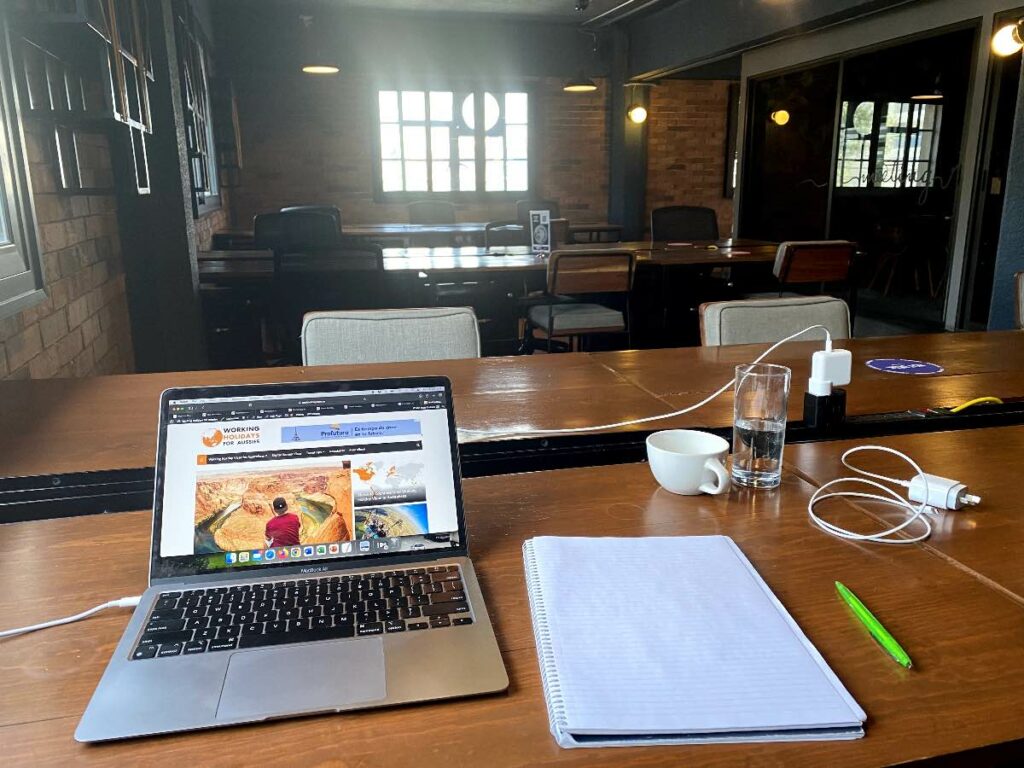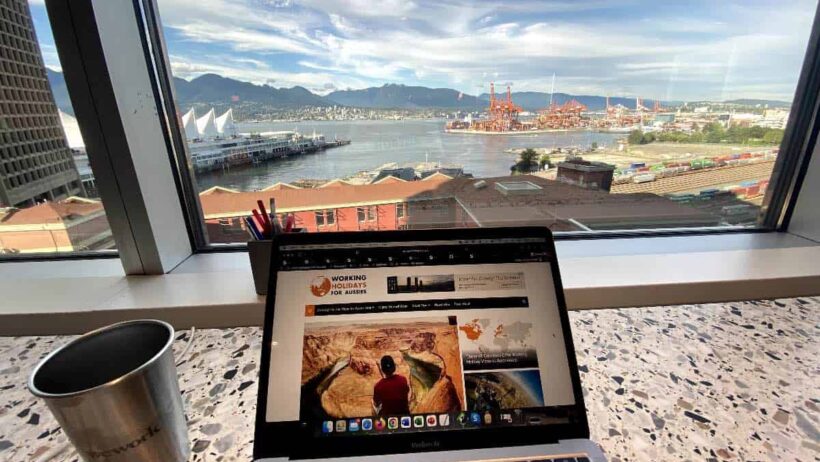You’ve probably see the flashy Instagram snaps of digital nomad influencers working on a beach while sipping on a coconut. Or typing away on a laptop from a campsite in the middle of the jungle. Or, in perhaps the most ridiculous example I’ve seen so far, taking a Zoom call while sitting on the clifftop edge of a canyon.
In reality, working on the beach is a terrible idea. Sand can get into your keyboard, the glare from the sun can make it hard to see, and let’s be honest – how productive are you really going to be when the ocean is so close, you can literally smell it. (In some parts of the world, your laptop might even get stolen when the beckoning waves inevitably tempt you.)
If you need a reliable internet connection to do your job, working in the middle of the jungle is probably a terrible idea as well. And need I say more about working while perched on a dangerous cliff?

The reality is, being a digital nomad isn’t quite as glamorous as it’s sometimes made out to be. Nonetheless, I personally love the nomadic lifestyle and it definitely has its perks.
So, where do digital nomads work if not on the beach?
I’m a big fan of co-working spaces. You can rent a hot desk for the day, or a fixed desk for a month. Either way, you’re surrounded by other people who also want to concentrate, with fast internet, in an environment that’s conducive to productivity. You can also meet people over lunch or after-work drinks. In my view, that’s worth the $10-20 per day that you might pay to use the space.
There are a few larger co-working space providers such as WeWork, but you can also find independently run spaces in most cities. I have a few favourites that I keep going back to in the cities that I regularly visit.
Digital nomads also often end up working from their accommodation, be that a hotel room, an Airbnb or a hostel common room.
If you’re on a budget or just like meeting people, staying in hostels can be great. But working productively in hostel dorm rooms can be a bit challenging as there often isn’t a desk, and taking calls while other people might be sleeping in the same room is rude. Hostel common areas can also sometimes be noisy and distracting.
That said, there more hostels are opening up that cater to remote workers. For example, you might find a hostel with a co-working space on site. Sometimes (e.g. if you’re staying at a Selina property) it costs extra to use this, but not always.

Failing that, you can always go to a café for a few hours. Or find a co-working space, as per above.
Working on public transport (e.g. long-distance trains) can also save you time, although the Wi-Fi can be a bit hit-and-miss. Because I can’t always rely on public Wi-Fi, I usually make sure I have data available on my phone as a backup.
Are time zones a challenge?
If you’re travelling somewhere in a similar time zone to your home country, then time zones are unlikely to be too much of a problem. But if you’re on the other side of the globe, and you need to work the same hours that you would at home, it could get difficult.
You may need to get up early or stay up late to attend meetings. This can be a bit disruptive if you’re not used to it.
We’ve put together a separate article about working productively in another time zone.
Who can be a digital nomad?
If you run an online business or have a job that you’re able to do remotely, and you’re open to leaving your comfort zone, you could be a digital nomad. You don’t necessarily need to make it your whole lifestyle – you could even just travel somewhere for a few days or weeks and work from there.

Many digital nomads are IT specialists, content creators or online language teachers. But there are also remote workers in many other fields.
If you want to base yourself overseas for a longer period, and your job allows you to do so, you may consider applying for a digital nomad visa in one of the many countries that now offers these.
If you’d like to learn more about the practicalities of being a digital nomad, Nathan James Thomas has written a helpful book called ‘Untethered’. (I’m not getting paid to promote this book – I just thought it was a worthwhile read.)
Is being a digital nomad worth it?
This really depends on your personality and what you value. If you like being close to your friends and family at all times, want predictability, and don’t like giving up your creature comforts, then the digital nomad lifestyle is probably not for you.
The reality is that it can also sometimes be difficult for digital nomads to be productive on the road. And some people might find all the travel tiring. I plan my travel specifically to ensure I’m able to be productive at the same time. It can be done, but it’s an art I’ve developed over many years.
At the same time, if you are fortunate enough to have a job where remote work is possible, the digital nomad lifestyle can be very rewarding. You can enjoy some great adventures and step outside of your comfort zone, without having to make huge sacrifices.
You won’t be able to spend all day sightseeing or partying if you have work to do. But once you’ve finished for the day, you have a completely different city to explore!
Matt is the founder of Working Holidays for Aussies. Passionate about travel and always looking for great deals, he believes that a gap year is the perfect opportunity to immerse yourself in another culture and learn all the things they didn’t teach you in school!
Originally from Australia, Matt has travelled to over 100 countries, lived in 7 countries, and has extensive real-world experience with working holiday visas.












